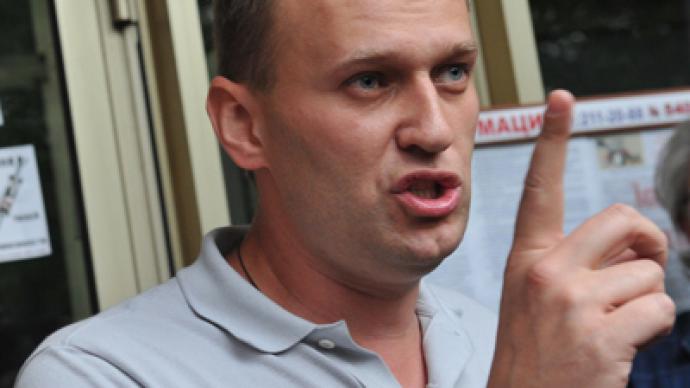Banknote stamp stunt: Viral cash campaign targets 'crooks & thieves'

Russian blogger-cum-opposition leader Aleksey Navalny has called on his supporters to troll the authorities by stamping slogans on banknotes, suggesting that with due effort the medium could provide contact with each and every Russian citizen.
Navalny wrote in his blog that at first he considered political ads on the money little more than a joke – it seemed funny, but not very effective. However, after studying the statistics of banknote circulation he changed his mind.With each bill changing hands from one to three times per day and with average lifespan from seven months to two years, a slogan stamped on a banknote will reach from 600 to 700 people on average, Navalny estimated. But even with only 200 people reading the slogan, 100stamped bills will have an average audience of 20,000. Thus, if a group of 5,000 people stamped 100 bills each in just a year, the move would create enough stamped money so that each Russian citizen will have got hold of at least one.Navalny illustrated his post with a picture of the money from his wallet – several 100-ruble notes with the slogan “United Russia is a party of crooks and thieves” stamped in blue ink on the white section. The slogan is Navalny’s personal creation, coined in early 2011. The slogan has caused one United Russia member to sue Navalny over damage to his reputation, but the court ruled in favor of the blogger as the latter carefully presented the definition as his personal opinion and estimation. At the same time, in June 2012, a different court obliged the blogger to pay 30,000 rubles (about $900) in compensation to UR member Vladimir Svirid for the comments Navalny made about United Russia in his interview with the Esquire Magazine.The latter case gave UR motivation to launch its own website in order to file a collective lawsuit against the blogger. The website offered an opportunity to sue Navalny simply by printing out the provided documents, filling their names in and paying a duty. The authors of the project hope that if all the members of United Russia – about 2 million people – file suits against Navalny, he might be fined as much as 60 billion rubles ($1.8 billion).In his most recent post urging the currency action, the blogger also wrote that his suggested type of propaganda was cheap, relatively effective and absolutely legal. As for that last definition, it should be noted that in 2011 Russian police launched a criminal case against a man on the Far Eastern island of Sakhalin for a very similar offence – the man wrote slogans on banknotes. In this case, however, the slogans were written by hand and police said they were extremist in nature, though they never provided a single example.













